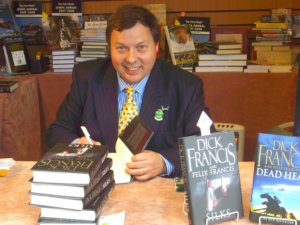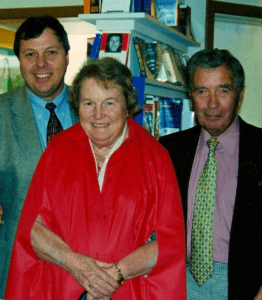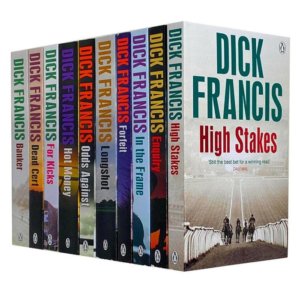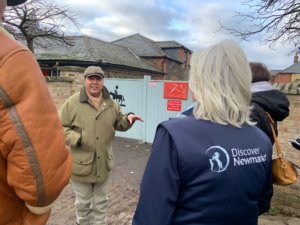
Felix Francis was just three years old when his father, then a leading jockey, was involved in the most dramatic Grand National finish of them all. His mount, Devon Loch, owned by the Queen Mother, looked a sure fire winner but, in the straight, hit by what his rider later described as a wall of sound generated by the 250,000 strong crowd at Aintree all cheering what looked a certain Royal triumph, he sprawled on to his belly as if he had been shot and was passed by ESB who galloped on to win.
The story of the 1956 Grand National was one even the most accomplished thriller writer would have struggled to pen. Ironic then that the jockey involved in that infamous incident went on to become one of the world’s most read authors.
“I was too young to go to the Grand National in 1956 and it was before the race was shown live on television,” said Felix. “However, my mother told me that afterwards I used to regularly scamper across the sitting-room floor on my hands and knees and then go down on to my tummy shouting ‘Look at me, I’m being Devon Loch. Bump’.
“It doesn’t seem to have been the most tactful of actions and perhaps it was a surprise that I reached my fourth birthday.
“But my father always said he owed more to Devon Loch’s collapse than if he had won the race,” he said.
“That one incident thrust the name Dick Francis from the back pages to the front. Injury forced Dad to retire the following year and he was introduced to a literary agent, John Johnston, who suggested he write his autobiography which he called the Sport of Queens with the permission of the Queen Mother.
“He was later asked by John Junor, then editor of the Sunday Express, to write six articles on the current racing scene. He went on to write for the paper for 16 years and he said that’s what taught him to write.
“In 1961 my mother said to my father, ‘the carpet is wearing out, the car’s beginning to knock and you have two boys to educate. You always said you were going to write a story so now’s the time’. Dad set to work.

“With my mother’s help, together, they wrote Dead Cert which was published in January 1962 and then there was one more every year for the rest of the millennium.
Someone asked me recently, ‘Did you write all of the Dick Francis books?’ I said I’d like to think so, but I was only eight when the first one was published. I grew up in what I considered to be the greatest fiction factory of the 20th century. My mother used to call it a cottage industry without the cottage.
Discussion over our breakfast table was not which of my parents was doing the school run but could Sid Halley survive the night with a .38 slug in his guts or how much pressure is required to strangle someone?
Felix said he wrote things for his father’s books from an early age. “When I was a 17- year-old A-level physics student I designed the bomb that blew up an aeroplane in Rat Race, which was published in 1970, and I wrote the computer programme in Twice Shy. But you realise how time has moved on because recently my daughter read it and asked, ‘What’s a cassette’ ?
“I went on to write many of the scientific bits of future novels and I have certainly been involved with many aspects of research.
My parents got to 1999 when Second Wind was published and decided that was it and they would not go on any more. My mother had had polio when she was 26 and it left her with great difficulty breathing. They had moved to warmer climes and lived in the Caribbean because she could not live in the cold of the English winter.
The effects of the polio were starting to come back and she was tired and they decided they were going to retire and went to Ascot for Diamond Day when they took a copy of Second Wind to give to the Queen Mother. My father had always asked the Queen Mother if he could dedicate a book to her and she would always wag her finger at him and say ‘only when I’m 100’. At Ascot, just as my father was about to tell her this would be the last one, because they were retiring, the Queen Mother said, ‘I am looking forward to my book next year’.
“And I remember driving them home and my mother saying ‘we will have to do another one’. And they did. It was called Shattered and it was very well named because it was a shattering experience for them. I went out to their home to collect the book to bring it back and when I got there with a week to go to deadline day, the book was only two-thirds written. I literally rolled up my sleeves and I wrote the last third of that book in a week. In the autumn, when it came out, my parents announced they would be retiring, it would be the last book and they meant it.
“My mother’s long and happy retirement lasted precisely 21 days. She succumbed to a heart attack. It was one book too far and was very well named, Shattered.
“My father announced that would be it and everyone thought that would be the end of the Dick Francis books. I, by this time, had gone into school teaching, I taught A-level physics for 17 years, but I also started managing my father’s affairs.”
In 2005 Andrew Hewson, his father’s literary agent, asked Felix to lunch at the Gay Hussar in Greek Street in London’s Soho. Now closed the restaurant had been infamous as a hotbed of political intrigue . . . now another plot was being hatched.

“He said to me ‘Felix, we have a problem, all your father’s books are going to go out of print’. And that was a problem because I had quite hoped they would give him a pension all his life and I had rather hoped they would give me one too,” said Felix.
“He said the problem was the buyers are young. They don’t remember, and there’s no longer a new hardback each year to remind them so they’re simply not ordering the backlist. ‘What we need is a new hardback’.
“It was the worst kept secret in publishing that my father and mother worked on the books together,” said Francis. “Stories used to pour out of my father like water over a waterfall and my mother, who was a great believer in the rhythm of a sentence, would correct his prose so it became easy to read. Some reviewers said the Francis books were easy reading, but let me tell you we worked bloody hard to make them so.
“But my mother had been dead for five years and my father, who was 85, and, bless him, could hardly remember what he had had for breakfast, let alone write a book. So I told Andrew it was not going to happen.
“But what he was asking for was my permission to ask an established crime writer to write a Dick Francis novel,” said Felix. “Is that allowed, I asked?”
He assured it was and said several authors had written James Bond novels since Ian Fleming died and there had been plenty of new Sherlock Holmes stories.
“Well, I must have had a few glasses of wine because I heard myself saying, ‘before you ask anyone else I would like to have a go’.
“And to his eternal credit he did not roll his eyes or laugh, he said ‘I will give you two months to write two chapters and then we will see’. I took that to mean that, when I had failed dismally, he would again seek my permission to ask his chosen, established, crime writer.
“I went home to my wife and said I think I have done something rather silly and she said ‘well you better get on with it’. I wrote what turned out to be four chapters, had another lunch with the agent and he said ‘there are two things you have got to do, you better get on and finish it and you better talk to your father’.
“When I told Dad we needed a new hardback and he said no. I said it could be about race fixing which was very much in vogue at the time, I said we could bring back investigator and ex-jockey, Sid Halley. ‘No’, he said. I said I have got a title, Under Orders. I gave him the chapters I had written, he got very excited by it, and I got on and finished it, and it came out in September 2006.
“It didn’t have my name on it anywhere except on the thanks page and it came out as a Dick Francis novel. And it sold, of course it sold, as it had Dick Francis on the cover. I was afraid the reviews would all say Dick’s lost it. But they didn’t. Instead they all announced ‘The Master is back’ but I wasn’t allowed to tell anyone I had written it until I was released from the contract clause eight years later.
The next four books after Under Orders was published had both names on the jacket but in truth, Felix wrote them and his father read them. The last of those four, Crossfire, was only half-written when Dick died, and he had not been well enough to read a single word of it.
Using a chef as the main character in Dead Heat came about as a result of a throw-away comment made by Francis’s publisher who bemoaned the fact that there was so little shelf space in bookshops for good thrillers because of the huge number of cookbooks.
“It was set in Newmarket and called Dead Heat,” said Felix. “As far as I was concerned it was going to come out as another Dick Francis but the American publishers took fright because they had known who had written Under Orders and if they did another one they thought they might get sued. So it came out with Dick Francis in huge letters and, underneath, in the smallest font they could find, and Felix Francis.

Sixteen years on from that life-changing lunch at the Gay Hussar, Iced, published in September became Francis’s 15th book, his name now writ large on the front, but still with A Dick Francis Novel printed under the title. “That is my choice. I feel that, in spite of Dad’s death in 2010, he is as much a part of my books as I now feel that I am part of all of his.”
In 2010 Michael Joseph, who was the publisher of all the Dick Francis novels up to 2000, published all the back list and they are still in print.
“I must be doing something right. That lunch all those years ago transformed my life as I now consider myself as the author of the Dick Francis novels and certainly the person who looks after the Dick Francis novels.”
He revealed he had signed a deal for an upcoming television series, with the working title, The Turf, and based on the works of Dick and Felix Francis.
And his advice for prospective novel writers. “Characters and plots, that’s what’s the most important, without them you don’t get the story and you have got to care about the characters. The characters go on a journey. They are changed by the events which occur in the book. At the end you just hope it makes the readers heart just beat a little faster and I am never afraid to say that sometimes when I write books what I write makes me cry.
“If it didn’t make me cry how could it make anyone else cry and that’s what you have got to get you have got to get emotion into it. The best tip I can give anyone about writing anything is get someone to read it out loud to you.
“My wife, Debbie, is a great support and help. I discuss every aspect of plot with her and she reads what I write on a daily basis, often out loud to me so I can hear if the rhythm is right. If it sounds to me like rubbish, it probably is. She is the only person I allow to read the manuscript before it is delivered to the publisher. I stop her reading it when we get to the last quarter because I want to save up the hard hitting punches so I get a reaction from her. If it passes her critical eye I’m less worried about my editor.”


08/04/2024
Discover Newmarket Enters New Partnership with National Horseracing Museum
Discover Newmarket will manage Visitor Services on behalf of the National Horseracing Museum in an exciting new partnership agreed last week.
18/03/2024
The Story of The Tin Man
Retiring as a living legend at the National Stud
Since arriving at the National Stud in April 2022, this retired legend is most definitely a firm favourite amongst our tour attendees.
06/03/2024
Easter Activities in and around Newmarket
With Easter just around the corner, there’s the promise of warmer weather and the chance to celebrate over the long weekend, is in sight.
29/02/2024
Time called for long-standing employee, Alan Grimwood, at Corney and Barrow
Alan is a familiar face to many in and around Newmarket as he drives the Corney and Barrow branded, red van delivering wines and spirits.
19/02/2024
Ely Cathedral: A Celebration of Bridal Gowns Exhibition
Just a stones throw away from Newmarket, Ely Cathedral is highly regarded by historians and architects from all over the world for its beauty and size.
31/01/2024
Your Guide to making Valentine’s Day Special
Show them how much they’re loved, with our special Valentine’s Day Guide.
Visit East of England and see where they became Master of the Air!
18/01/2024
Become a Tour Guide with Discover Newmarket
Discover Newmarket is the official tourism body for Newmarket and the surrounding area, responsible for promoting Newmarket as a key destination for the East of England.



